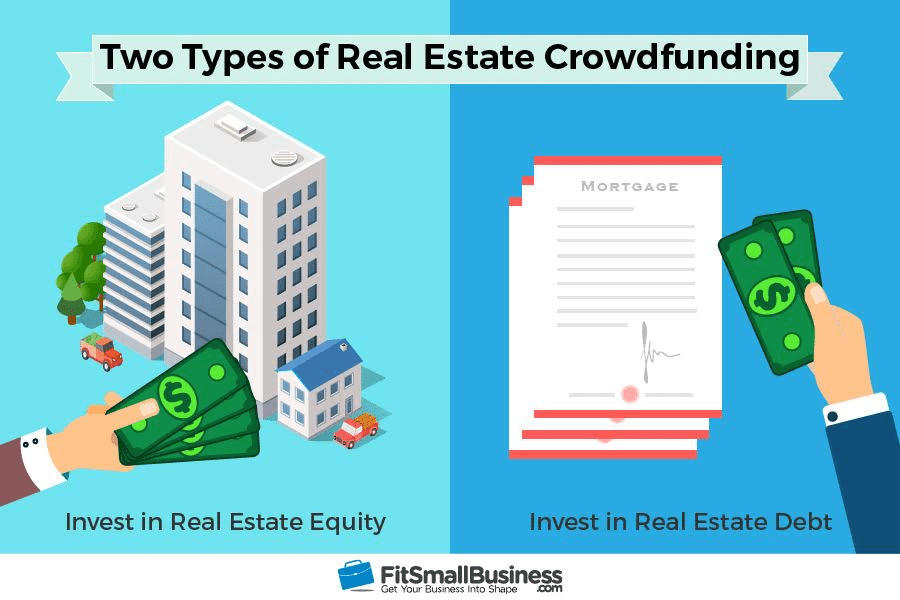In recent years, real estate crowdfunding has emerged as a popular form of investment that seems to have caught the attention of savvy investors and budding entrepreneurs alike. The concept of crowdfunding involves pooling small amounts of money from various individuals to finance a project or venture, which in this case, is real estate.
Equity Or Debt Real Estate Crowdfunding?
When it comes to investing in real estate crowdfunding, there are two primary types of investments – equity and debt. Equity crowdfunding is a type of investment where investors purchase shares in a real estate project, thereby making them partial owners of the property. This means that investors are betting on the success of the investment and stand to earn a share of the profits if the property sells or appreciates in value. On the other hand, debt crowdfunding is a type of investment where investors lend money to real estate developers or borrowers at a fixed interest rate. In this case, investors are not owners of the property, but are simply making a loan to the borrower.
If you are considering investing in real estate crowdfunding, it is important to understand the differences between equity and debt investments and determine which type of investment is best suited for your needs and financial goals.
How Crowdfunding for Real Estate Works
The process of real estate crowdfunding typically involves several players, including the real estate developer, the crowdfunding platform, and the investors. The developer or borrower submits a project proposal to the crowdfunding platform, outlining the details of the project, such as the location, expected return on investment, and the amount of money required to complete the project. The crowdfunding platform then lists the project on its website, where investors can view the project and decide whether or not to invest.
Once the project is fully funded, the crowdfunding platform releases the money to the developer or borrower, who then uses the funds to complete the project. As the project progresses, the developer or borrower provides regular updates to investors about the project’s status.
When the project is completed, investors receive a return on their investment according to the terms of the investment agreement. This can either be in the form of a share of the profits, in the case of equity crowdfunding, or a fixed interest payment, in the case of debt crowdfunding.
What is Real Estate Crowdfunding?
Real estate crowdfunding is a form of crowdfunding that allows individuals to invest in real estate projects without the need for a large amount of capital. Unlike traditional real estate investment, which requires a significant amount of capital, real estate crowdfunding typically facilitates smaller investments, making it more accessible to a wider range of investors.
Real estate crowdfunding platforms have become increasingly popular in recent years, and there are now a variety of different platforms to choose from, each catering to different types of investors and investment opportunities.
Real Estate Crowdfunding Platforms
There are many real estate crowdfunding platforms available in the market today. Some of the most popular platforms include Fundrise, Realty Mogul, and Roofstock.
Fundrise offers different portfolios of real estate investments that are designed to cater to investors with varying risk tolerances, while Realty Mogul focuses on commercial real estate investments. Roofstock, on the other hand, is more geared towards individual investors who want to purchase single-family rental properties.
Investors should carefully research each platform before investing and consider factors such as fees, investment minimums, and the track record of the platform and its investments.
Conclusion
Real estate crowdfunding is a compelling investment opportunity for investors looking to diversify their portfolio and gain exposure to the real estate market. While it is important to understand the risks and benefits of crowdfunding, as well as the different types of crowdfunding investments, the potential for high returns and accessible entry points make real estate crowdfunding a viable option for investors looking to take advantage of the opportunities presented by the real estate market.
Investors should do their due diligence, conduct ample research, and select a reputable crowdfunding platform that aligns with their goals and investment preferences. With the right approach and careful consideration, real estate crowdfunding can be a lucrative and rewarding investment strategy for individuals of all backgrounds and financial means.



